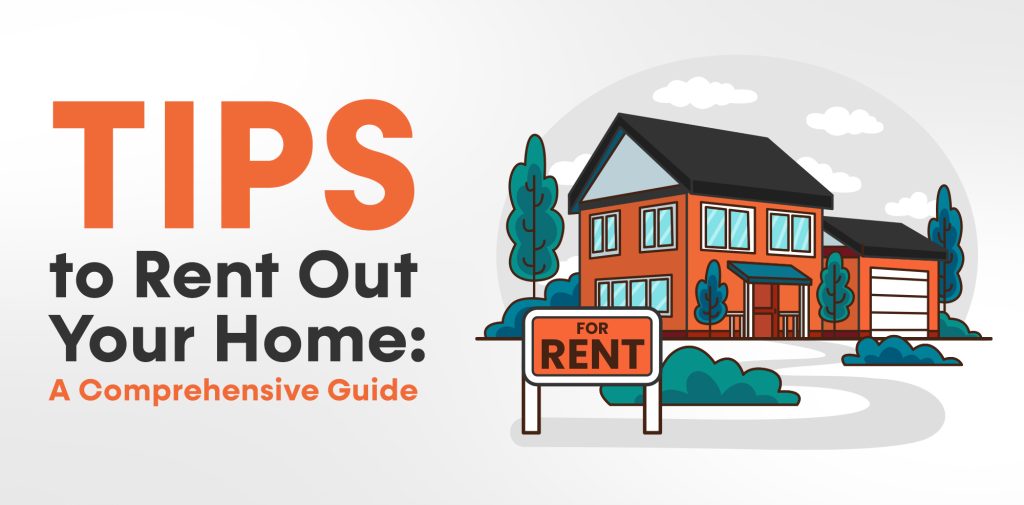If done right, renting out your home may be a profitable endeavour. It offers a chance to keep your home correctly, manage your property effectively, and generate passive income. It does, however, need careful preparation, strategy, and attention to detail, just like any investment. This book gives crucial advice to make the process go more smoothly, regardless of whether you are a first-time landlord or have rented out your Home before.
Considering the Advantages of Hiring Out Your Home
Prior to reading the advice, you should be aware of the main advantages of renting out your Home. Throughout the process, these benefits can keep you informed and motivated.
Passive Income: Renting out your home guarantees a consistent flow of money that can assist in paying your property taxes, mortgage, and maintenance expenses. This is known as passive income. In certain circumstances, you might even make money.
Increased Property worth: Renting out your home may raise its worth if the real estate market continues to grow. Maintaining it improves the likelihood of a successful resale.
Flexibility: By renting out your property, you can keep it without having to sell it. This is especially helpful if you intend to move back into the home later or if you want to wait for a better sale price until the market improves.
Property Maintenance: When you have renters residing in your home, the likelihood of the property degrading from an extended period of vacancy is reduced. Renters will assist with upkeep, and you can conduct routine condition checks on the property.
Now that you are aware of these advantages, let’s get to the useful advice for renting out your home.
2. Get Your Home Ready for Rental
Make sure your home is in good enough shape to draw in prospective tenants before listing it for rent. Here’s how to prepare your home for rental purposes:
Maintenance and Repairs: Check the Home for any issues that require attention. Resolve any structural, electrical, or plumbing problems to prevent complaints from tenants. Be mindful of small problems, such as creaky doors, broken windows, or leaky faucets.
Painting and Cleaning: An immaculate home gives a good first impression. Thoroughly clean the walls, windows, and carpets on the premises. Additionally, a room might appear more welcoming and well-maintained with fresh paint.
Appliances and Furnishings: You may wish to rent the Home furnished or unfurnished, depending on your target market. If you provide appliances, be sure they are all in good operating order. Make sure the furnishings are attractive to renters and in good shape if you’re offering a furnished Home.
3. Establish a Reasonable Rent Amount
A reasonable return on your investment and the attraction of tenants depend on you setting the rent amount correctly. Determining a competitive rate for your home might be facilitated by conducting research on the local rental market.
Market research: Find out the rent that comparable properties in your neighbourhood are asking for by looking at them. For example, if you are renting out a Home in Chandigarh, find out the going prices by looking at other Chandigarh rental properties. This will assist you in determining a reasonable price that meets consumer demand.
Consider Amenities: You might be able to raise the rent if your home has amenities like a garden, parking, or contemporary appliances. To support the pricing, emphasise these features in your listing.
Think About Expenses: Remember to account for recurring expenses like property taxes, insurance, upkeep, and any mortgage payments. Make sure the rent generates a profit margin in addition to covering these costs.
4. Effectively Promote Your Home
It’s time to find tenants after your home is completed and you’ve decided on a rent amount. Effective advertising is essential to drawing in prospective tenants.
Online Listings: Place a listing for your home on well-known rental and real estate websites. Provide precise and thorough descriptions as well as excellent images of your home. To find local tenants, use search-friendly terms like “Home for rent in Chandigarh”.
Local Advertising: Don’t discount more conventional approaches like placing “For Rent” signs in your neighbourhood or placing an ad in the local paper. Renters can also be found through word-of-mouth referrals.
Social media: Use sites like Facebook, Instagram, and Twitter to advertise your home. Join neighbourhood real estate clubs so you can advertise your rental property there.
5. Carefully Screen Tenants
Probably one of the most crucial procedures in the leasing process is tenant screening. While a bad tenant might generate issues, a good tenant can make renting out your Home stress-free.
Background Checks: To make sure the tenant is trustworthy and has a regular income, perform extensive background checks, including credit and criminal histories.
Rental History: To learn more about a tenant’s past rentals, request references from prior landlords. This might assist you in avoiding renters who have a track record of breaking the law or causing damage to property.
Interview Tenants: To determine whether a prospective tenant is a good fit, do an in-person or virtual interview. Inquire about their work, the reason they moved, and how long they would like to stay.
6. Draft a Comprehensive Leasing Contract
A legally enforceable contract between you and the tenant is your lease agreement. It should specify exactly what each party is expected to do in order to prevent confusion or disagreements down the road.
Important components: Make sure the lease contains all the pertinent details, including the amount of rent, the due dates, the payment schedule, the security deposit, and the maintenance obligations. Indicate the duration of the lease as well as any terms that may be added or removed.
Include any home rules you may have, such as those pertaining to parking, noise limits, and pet policies, in the agreement. Make sure the tenant understands what will happen if they break these guidelines.
Legal Protections: To make sure the lease agreement complies with local rental regulations and provides legal protection for both parties, think about having a lawyer evaluate it.
7. Effortlessly Manage Your Property
Once the tenant has moved in, your responsibilities as a landlord don’t end. Effective property management is essential to preserving your connection with your renter and safeguarding your investment.
Frequent Inspections: Arrange for frequent property inspections to make sure the renter is maintaining the home properly. This also enables you to see possible maintenance problems early on.
Reactive Maintenance: Attend any tenant requests for maintenance as soon as possible. Deal with concerns as soon as possible to prevent larger ones later on. Tenants are more likely to be happy and renew their leases when the property is well-maintained.
Rent accumulation: Make sure your rent collection process is transparent and dependable. To make it simpler for tenants to pay, set up online transfers or automatic payments.
8. Easily Manage Tenant Changeover
Being a landlord inevitably involves dealing with tenant turnover. It’s critical to manage the tenant move-out process well in order to minimise vacancy and get the Home ready for the next tenant.
End of Lease Inspection: Upon the expiration of the lease, thoroughly inspect the home. If there are any problems beyond typical wear and tear, keep track of them and, if required, deduct the cost of repairs from the tenant’s security deposit.
Re-advertising: As soon as the tenant gives notice that they intend to leave, the Home should be advertised again. This guarantees a consistent revenue and shortens the duration of vacancy.
Cleaning and Repairs: In order to have the Home ready for the next tenant, clean it after the tenant vacates and perform any required repairs. This guarantees that the property will stay in good shape for upcoming renters.
9. Keep informed with market developments
The rental real estate market is subject to change, so it’s critical to keep up with the latest developments. You may use this information to make wiser choices about rent amounts, expectations from tenants, and renovations for the property.
Demand for Rentals: Monitor demand in your local market. For instance, you can think about raising the rent or providing incentives to draw in renters more rapidly if you observe a rise in the demand for Chandigarh rental homes.
Improvements and Upgrades: Take into account updating your home in light of current market trends. Your home may attract more renters if it has features like energy-efficient appliances or smart home systems.
Taxes and Regulations: Keep abreast of any modifications to the local rental legislation and tax codes that may affect your obligations or earnings as a landlord.
10. Take a Look at Expert Property Management
You might wish to work with a professional property management company if you find that managing your rental property is becoming too complicated or time-consuming. They can take care of everything, including collecting rent and screening tenants, so you can concentrate on other important tasks.
Advantages of Real Estate Management: Daily responsibilities like maintenance requests, tenant communications, and legal documentation can be handled by a property manager. This is especially helpful if you live far from your rental home or own several properties.
Costs: The average cost that property management companies charge is a portion of the rent each month. Even if doing this lowers your overall earnings, if it saves you tension and time, it might be worth the expense.
Also Read - Indian Rental Market Trends 2024
Also Read - How to get tenants for rental property
Conclusion
If you go into it with the correct plan, renting out your home may be a profitable endeavour. You may guarantee a successful and trouble-free renting experience by being aware of your legal responsibilities, organising your property, determining a fair rent amount, and handling tenants skillfully. These pointers will assist you in renting out a home effectively, whether it’s in a calm neighbourhood or a busy metropolis like Chandigarh.
If you’re planning to rent out your Chandigarh home, remember these pointers and get your property ready to draw in dependable and responsible renters. It’s possible to turn renting out your Home into a stress-free and profitable investment with a little preparation.



